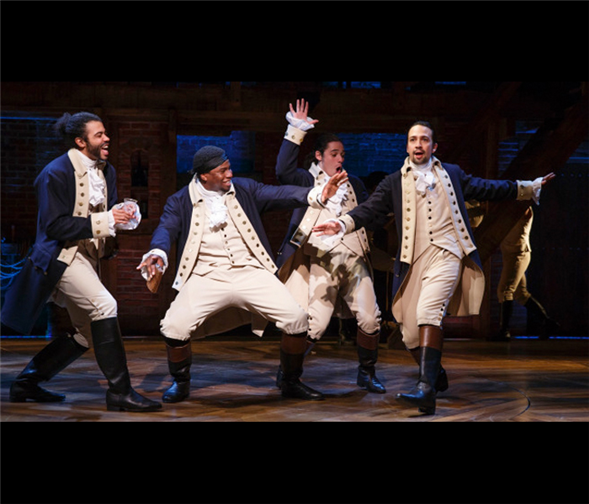Last month, TDF and the Public Theater filled two Wednesday matinees of
Hamilton with high school students from around the city, most of whom had never seen a show before.
These nearly 600 young people probably didn't know that
Hamilton is one of the buzziest productions of the season, that's it's been fast-tracked for a Broadway transfer this summer, or that its use of hip-hop to tell the story of Alexander Hamilton and Aaron Burr has been hailed as an invigorating evolution for both musical theatre and our contemporary conversations about American history.
But their lack of theatre experience didn't keep the students from being an enthusiastic audience. Just ask Lin-Manuel Miranda,
Hamilton's writer and star. He tweeted this response after the March 11 matinee:
Christopher Jackson, who plays George Washington, felt the same:
The actors' reactions underline a unique benefit of arts education programming: Young people with fewer preconceptions about what the theatre is "supposed to be" can transform the energy of a performance. Their presence alone emphasizes that the audience is as much a part of theatre making as the performers.
"A house full of students is simply electric," says Tom McCann, the Public's Senior Director of Marketing. "Students bring an incredible amount of openness and honesty with them. You can't fool them, and when they are connected to the artists and the storytelling, it's genuine."
Often, of course, the students are just as impacted by the artists as the artists are by the students. That was obvious during the intermission of the March 11 matinee. High schoolers were buzzing everywhere in the Public's lobby, discussing the performance with a uniquely teenage intensity. "I knew a little bit about this history because you learn about it in school, but it's cool to see it in action," said Isaiah Duran, a student at Hudson High School of Learning Technologies. "I can't even decide which characters I like because some of them seem so slimy."
His brother Jacob Duran picked up on the "history comes alive" motif, as well as the fact that all the characters are played by non-white actors. "I like the fact that they added different kinds of people," Jacob said. "It shows that everybody, all kinds of people, worked together. It sends a message, but in a more interesting way."
Meanwhile, Hudson student Jebryl Batchilly was drawn to
Hamilton's modern sound. "I like hip-hop music, and they've turned hip-hop into something historical," he said.
{Image1}
This is the kind of insight that can help a show linger in a student's mind and hopefully encourage a lifelong appreciation for theatre as a vital, relevant art form. "For a lot of our students, this is the first show they've ever seen, and that has educational value in and of itself," noted Adam Markowitz, a Hudson High School teacher who was also at the March 11 performance.
And the educational impact doesn't have to be limited to the day of the show. That's why
Stage Doors, the TDF education program that facilitated these matinees, also conducted multiple in-class workshops connected to the show. They were intended to give first-time audience members a deeper understanding of what the theatre is, as well as a richer connection to the performance.
But it's not enough for students to hear from adults. They need to talk to each other as well. That can push their intellectual and emotional engagement even further. That's why Stage Doors participants were invited to join the
Hamilton conversation at SEEN, a student-driven TDF website that lets young people respond to the theatre with their own words and photos.
SEEN asked this pointed question about the show: "Were the Founding Fathers (of the USA) honorable, gangsters or both?" Over 100 students responded with comments that touched on everything from our view of history to the way
Hamilton itself was produced.
This dense collection of experiences -- from actors responding to their audience to patrons thinking about a show for days -- clarifies why TDF's education programs exist. It reminds us all what can happen in the theatre if we open ourselves to what's passing between the artists and the crowd.
---
Mark Blankenship is the editor-in-chief of TDF Stages
"Hamilton" production photo by Joan Marcus. Student photo courtesy of Democracy Preparatory Charter High School of Harlem.